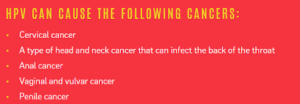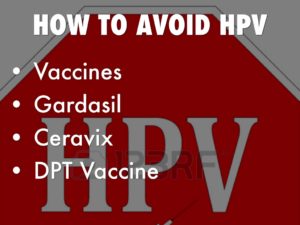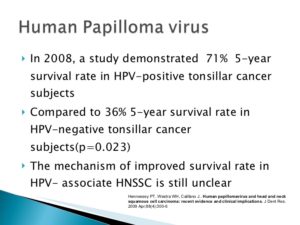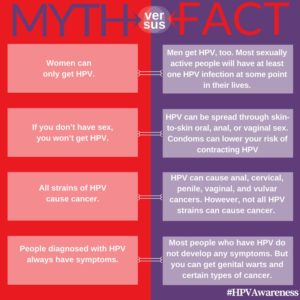How to avoid HPV and the health problems it can cause=PREVENTION, like almost every other disease.
You can do several things to lower your chances of getting HPV.
Get vaccinated. HPV vaccines are safe and effective. They can protect males and females against diseases (including cancers) caused by HPV when given in the recommended age groups (see “Who should get vaccinated?” below). HPV vaccines are given in three shots over six months; it is important to get all three doses.
Get screened for cervical cancer. Routine screening for women aged 21 to 65 years old can prevent cervical cancer.
For those sexually active do the following:
–The right way to do SAFE SEX is the safe way everytime. This can lower your chances of getting HPV. But HPV can infect areas that are not covered by a condom – so condoms may not give full protection against getting HPV.
- Be in a mutually monogamous relationship – or have sex only with someone who only has sex with you.All boys and girls ages 11 or 12 years should get vaccinated.The vaccine is also recommended for gay and bisexual men (or any man who has sex with a man) through age 26. It is also recommended for men and women with compromised immune systems (including people living with HIV/AIDS) through age 26, if they did not get fully vaccinated when they were younger. How do I know if I have HPV?
- ONE go to a doctor! Simply get tested and have the doctor examine your genital area.
- Unfortunately there is no test to find out a person’s “HPV status.” Also, there is no approved HPV test to find HPV in the mouth or throat.
- There are HPV tests that can be used to screen for cervical cancer. These tests are recommended for screening only in women age of 30 years or older. They are not recommended to screen men, adolescents, or women under the age of 30 years old.Most people with HPV do not know they are infected and never develop symptoms or health problems from it. Some people find out they have HPV when they get genital warts. Women may find out at age 30 years and older when they get an abnormal Pap test result (during cervical cancer screening). Others may only find out once they’ve developed more serious problems from HPV, such as cancers. * HEALTH PROBLEMS related to HPV: Health problems r/t this illness include genital warts and cervical cancer.
- Genital warts: Before HPV vaccines were introduced, roughly 340,000 to 360,000 women and men were affected by genital warts caused by HPV every year.* Also, about one in 100 sexually active adults in the U.S. have genital warts at any given time.
- Cervical cancer: More than 11,000 women in the USA get Cervical Cancer caused by HPV.
- The Treatment for HPV:
- There is no treatment for the virus itself.
- However, there are treatments for the health problems that HPV can cause:
- Genital warts can be treated by you or your physician. If left untreated, genital warts may go away, stay the same, or grow in size or number.
- Cervical precancer can be treated. Women who get routine Pap tests and follow up as needed can identify problems before cancer develops. Prevention is always better than treatment.
Other HPV-related cancers are also more treatable when diagnosed and treated early like any other cancer
- If you are pregnant and have HPV, you can get genital warts or develop abnormal cell changes on your cervix. Abnormal cell changes can be found with routine cervical cancer screening. You should get routine cervical cancer screening even when you are pregnant.
- What happens if pregnant with HPV?
- Every year approximately 17,600 women and 9,300 men are affected by cancers caused by HPV
- Catch-up vaccines are recommended for males through age 21 and for females through age 26, if they did not get vaccinated when they were younger.
- PREVENTION IS THE KEY TO HPV and any other disease. For HPV prevention=VACCINATION!



